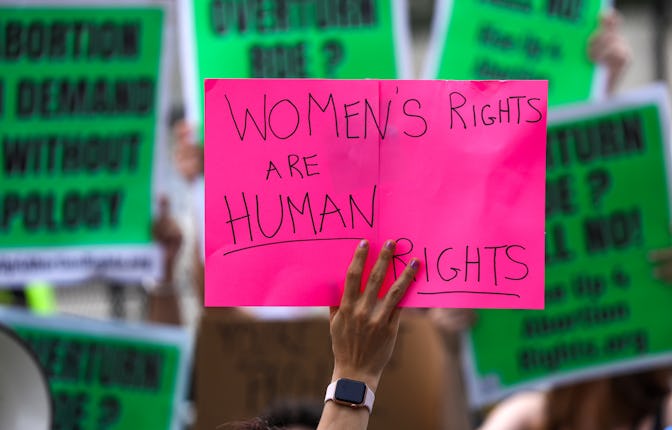Could the U.N. sanction the U.S. for human rights violations now that Roe is overturned?
The organization has made it clear that abortion access is a human right. Whether it’s willing to fight the U.S. over that is another story.

After decades of conservative attacks, Roe v. Wade is officially no longer the law of the land. In its ruling on a case out of Mississippi, Dobbs v. Jackson Women’s Health Organization, the Supreme Court overturned the federal protection of abortion access established in that landmark 1973 ruling. With the Court’s decision now final, many are wondering who, if anyone, can stop the coming tide of abortion restrictions in the U.S. — and even if global intervention from the United Nations is possible.
Last year, the U.N.’s special rapporteur, Dr. Tlaleng Mofokeng, condemned the U.S. over its threats to abortion access. In a brief, Mofokeng argued that overturning abortion rights like Roe would violate human rights treaties ratified by the U.S — including the convention against torture. She told The Guardian, “If [Roe] gets overturned, it has catastrophic implications, not just for the U.S.”
The Guttmacher Institute predicted that if the Court overturned Roe, 26 states were likely to ban abortion, including the 13 states with trigger laws in place. But Mofokeng told The Guardian, “We have this joke among us that when the U.S. sneezes the rest of the world catches a [cold]. So we know that politically that what happens in the United States ... does have an impact in precedents elsewhere in the world.”
Keeping that in mind, is it possible for the U.N. to intervene at all now that Roe is overturned? Well, it’s complicated.
Is abortion access really a human right?
In 2018, the United Nations’s Human Rights Committee’s General Comment on the Right to Life affirmed the importance of abortion access. It states that the right to life “concerns the entitlement of individuals to be free from acts and omissions that are intended or may be expected to cause their unnatural or premature death, as well as to enjoy a life with dignity.”
While individual nations can regulate abortion access, the General Comment wrote that it “must not result in violation of the right to life” of a pregnant person. This means that restrictions cannot “jeopardize their lives, subject them to physical or mental pain or suffering, [or] discriminate against them or arbitrarily interfere with their privacy.”
Perhaps most importantly, the General Comment called on nations to remove existing barriers that prevent people from accessing abortions, including ones “caused as a result of the exercise of conscientious objection by individual medical providers.” It also said no new barriers should be introduced.
In a statement, Nancy Northup, president of the Center for Reproductive Rights praised the General Comment as “provid[ing] strong support for our global advocacy, litigation, and research that defines and enforces abortion as a fundamental human right.”
So, TL;DR: Yes, it is.
What actions can the U.N. take?
The U.N. has already condemned some of the U.S.’s anti-abortion laws. In 2021, human rights lawyer Melissa Upreti, the chair of the U.N.’s working group on discrimination against women and girls, told The Guardian, “[Texas’s new law] will make abortion unsafe and deadly, and create a whole new set of risks for women and girls. It is profoundly discriminatory and violates a number of rights guaranteed under international law.”
But let’s be real: Condemnations alone don’t mean much.
This wouldn’t even be the first time in this decade that the U.S. has been condemned for human rights violations. Following the murder of George Floyd, U.N. human rights chief Michelle Bachelet said, “The U.S. authorities must take serious action to stop such killings, and to ensure justice is done when they do occur ... The role that entrenched and pervasive racial discrimination plays in such deaths must also be fully examined, properly recognized, and dealt with.”
In other words, there needs to be material consequences — not just words. And theoretically, there are some actions that the U.N. can take. For example, if the U.N. actually treats the U.S. overturning Roe as a gross human rights violation, the Security Council could get involved. Under the U.N. charter, the Security Council can launch investigations, appoint special envoys, and exercise enforcement measures like economic sanctions, financial penalties, and others.
However, it’s unlikely that the U.N. would do much of anything. The U.N. was created in 1945 with the U.S. as one of its founding members. It leans on the U.S. dramatically. It’s probably not going to rush to alienate it.
If the U.N. is unlikely to intervene, can other countries step in?
Individual countries can sanction each other really whenever they want. You actually don’t need to look beyond the U.S. to see that, because America hands out sanctions like candy. Investopedia reported that as of March 2022, the U.S. has economic sanctions in place against over a dozen countries including Afghanistan, Cuba, Ethiopia, Hong Kong, North Korea, Russia, and Somalia.
So in theory, sure, other countries could impose economic sanctions against the U.S. I wouldn’t count on that happening, though. Doing so would mean that those countries face potential backlash from not only the U.S., but any of its allies. Even if a country decides to impose sanctions, the U.S. is the world’s largest global economy, so it may not have much effect.
Plus, sanctions are tricky. You have to target the people that are committing human rights violations. But actions like economic sanctions could threaten the same people that are most harmed by Roe’s overturn. Ultimately, the battle for reproductive agency in the U.S. is one that needs to be fought in the belly of the beast itself.